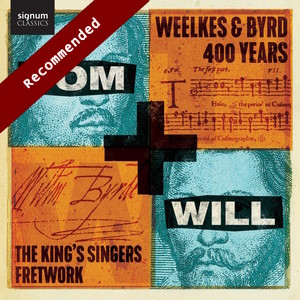
Tom + Will – Weelkes & Byrd 400 years
The King’s Singers
Fretwork
rec. 2022, St. Bartholomew’s Church, Orford, UK
SIGNUM CLASSICS SIGCD731 [71]
I suppose it was inevitable for Fretwork and The King’s Singers eventually to team up. It is about time, too. And it is an excellent plan to put together two great composers who left this world within a few months of each other.
It is puzzling that, as far as I can recall, Thomas Weelkes’s sacred works have been regularly recorded but no disc completely devoted to his secular music has ever released. It is especially odd because there are a great many of them. Year 1597 saw a Madrigal collection of twenty-four pieces, and1598 another twenty-four Ballets and Madrigals. A further twenty in six parts came out in 1600. Airs and Fantastic Spirits from 1606 consisted of twenty-six pieces mostly for three voices. William Byrd is not really remembered as a madrigalist, so his secular pieces are mixed in publications which include more serious or religious examples, published in 1588, 1589 and 1611.
The programme contains not only secular but some sacred pieces, among them two well-known anthems on the first and last track. “Tom + Will” is a deliberate informality, we read, because there are more secular works here. The booklet also says: “As no reliable depictions exist of either William Byrd or Thomas Weelkes, the graphic elements of this album make use of a famous pair of 18th century engravings supposedly showing William Byrd and his mentor Thomas Tallis.”
It is striking how original Weelkes’s pieces are, and how full of ingenious sophistication both in his use of chromaticism and with the texts he chose to set. He was clearly “a bit of a lad”, as we learn of his bad behaviour in Chichester where he was in charge of the music in the period just after 1600. His eccentric imagination is unique for the time, and his music holds attention without a problem. Byrd can be clever, even fun, as in This sweet and merry month and Who made thee Hob forsake the plough, but he never has the elan that Weelkes often demonstrates.
The performances show imagination and variety. Take Weelkes’s Say dear, when will your frowning cease. First, we hear the counter-tenor with the viols, on the repeat we have a lower voice singing the melody with the viols, then for the second half of the madrigal all voices are heard. The performance draws you in with its wonderful expressivity. Incidentally, Weelkes often favours a binary form for his madrigals.
Surprisingly perhaps, the disc treats us to instrumental works by Weelkes, and to also Byrd’s wonderfully clever Browning, normally performed simply by the viol consort. It is fascinating how the Browning melody – which amounts to just four bars – is, as the performance goes on, sung to the text “The leaves be green, the nuts be brown”. This really adds to the fun of the piece.
Two new works complete the programme. James MacMillan is Roman Catholic, and so was Byrd. (Byrd’s move from Harlington, where he may have been associated with the Nevill family, to Stondon Massey in quiet Essex was significant. It allowed him to work more privately for a Catholic family.) MacMillan’s setting of Ye sacred muses alongside that of Byrd is an inspired idea particularly as it is a warm and sensitive setting. It allows the voices to get all of the emotion found in the words.
Roderick Williams, also known as an outstanding recitalist, has set John Donne’s Death be not proud, placed here alongside Weelkes’s Death hath deprived me, a wonderful madrigal in memory of Thomas Morley. Williams’s setting often sounds like a piece of Jacobean consort music but the word setting is much more dissonant and austere. There is, then, almost a stylistic dichotomy but it all works quite convincingly.
This disc is a one-off, intelligently planned. It is also superbly performed. The King’s Singers are on the best form I have heard them for sometime. Fretwork, naturally, may be the finest viol consort around.
Gary Higginson
Help us financially by purchasing from



Contents
William BYRD (1543-1623) Praise our Lord, all ye Gentiles
BYRD If women could be fair
Thomas WEELKES (c.1575-1623) Say dear, when will your frowning leave
WEELKES Like two proud armies
WEELKES Pavan no. 3
WEELKES Thule, the period of cosmography
WEELKES What joy so true
WEELKES In nomine a4
BYRD Ye sacred muses
Sir James MACMILLAN (b. 1959) Ye sacred muses
WEELKES In nomine a5 (1)
WEELKES Hark all ye lovely saints above
WEELKES Death hath deprived me
Roderick WILLIAMS (b. 1965) Death, be not proud
WEELKES In Nomine a5 (2)
BYRD Who made thee Hob
BYRD This sweet and merry month of May
BYRD Browning / The leaves be green
BYRD Alack, when I look back
BYRD O Lord make thy servant Elizabeth


















